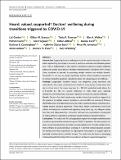Files in this item
Heard, valued, supported? Doctors' wellbeing during transitions triggered by COVID-19
Item metadata
| dc.contributor.author | Gordon, Lisi | |
| dc.contributor.author | Scanlan, Gillian M. | |
| dc.contributor.author | Tooman, Tricia R. | |
| dc.contributor.author | Walker, Kim A. | |
| dc.contributor.author | Cairns, Patrick | |
| dc.contributor.author | Ferguson, Julie | |
| dc.contributor.author | Aitken, Gillian | |
| dc.contributor.author | Cecil, Joanne | |
| dc.contributor.author | Cunningham, Kathryn B. | |
| dc.contributor.author | Gibson Smith, Kathrine | |
| dc.contributor.author | Johnston, Peter W. | |
| dc.contributor.author | Laidlaw, Anita | |
| dc.contributor.author | Pope, Lindsey M. | |
| dc.contributor.author | Wakeling, Judy | |
| dc.date.accessioned | 2022-01-06T16:30:04Z | |
| dc.date.available | 2022-01-06T16:30:04Z | |
| dc.date.issued | 2022-04-10 | |
| dc.identifier | 274439459 | |
| dc.identifier | 2e1d70ce-8c2e-4fd4-b6bb-0d243d034587 | |
| dc.identifier | 85120815977 | |
| dc.identifier | 000728335100001 | |
| dc.identifier.citation | Gordon , L , Scanlan , G M , Tooman , T R , Walker , K A , Cairns , P , Ferguson , J , Aitken , G , Cecil , J , Cunningham , K B , Gibson Smith , K , Johnston , P W , Laidlaw , A , Pope , L M & Wakeling , J 2022 , ' Heard, valued, supported? Doctors' wellbeing during transitions triggered by COVID-19 ' , Medical Education , vol. 56 , no. 5 , 14698 . https://doi.org/10.1111/medu.14698 | en |
| dc.identifier.issn | 0308-0110 | |
| dc.identifier.other | RIS: urn:BDF1F84E42D07F0F455204658DCC738B | |
| dc.identifier.other | RIS: urn:BDF1F84E42D07F0F455204658DCC738B | |
| dc.identifier.other | ORCID: /0000-0003-4779-6037/work/105956268 | |
| dc.identifier.other | ORCID: /0000-0003-1214-4100/work/105956335 | |
| dc.identifier.other | ORCID: /0000-0002-4986-1501/work/105957086 | |
| dc.identifier.other | ORCID: /0000-0002-3300-7220/work/105957161 | |
| dc.identifier.uri | https://hdl.handle.net/10023/24614 | |
| dc.description | This research was funded by the Chief Scientist Office of Scotland Rapid COVID Grant Call; further funding was received from the Scottish Medical Education Research Consortium Large Research Grant Programme through NHS Education for Scotland (NES). | en |
| dc.description.abstract | Introduction: Supporting doctors' wellbeing is crucial for medical education to help minimise negative long-term impacts on medical workforce retention and ultimately patient care. There is limited study of how doctors' transitions experiences impact wellbeing, particularly socially and culturally. Multiple Multidimensional Transitions (MMT) theory views transitions as dynamic, incorporating multiple contexts and multiple domains. Using MMT as our lens, we report a qualitative analysis of how transitions experienced by doctors during the pandemic impacted on social and cultural aspects of wellbeing. Methods: Longitudinal narrative inquiry was employed, using interviews and audio-diaries. Data were collected over 6 months in three phases: (i) interviews with doctors from across the career spectrum (n = 98); (ii) longitudinal audio-diaries for 2–4 months (n = 71); (iii) second interviews (n = 83). Data were analysed abductively, narrowing focus to factors important to social and cultural wellbeing. Results: Doctors described experiencing multiple interacting transitions triggered by the pandemic in multiple contexts (workplace, role, homelife and education). Patterns identifiable across the dataset allowed us to explore social and cultural wellbeing crosscutting beyond individual experience. Three critical factors contributed to social and cultural wellbeing both positively and negatively: being heard (e.g., by colleagues asking how they are); being valued (e.g., removal of rest spaces by organisations showing lack of value); and being supported (e.g., through regular briefing by education bodies). Conclusions: This study is the first to longitudinally explore the multiple-multidimensional transitions experienced by doctors during the COVID-19 pandemic. Our data analysis helped us move beyond existing perceptions around wellbeing and articulate multiple factors that contribute to social and cultural wellbeing. It is vital that medical educators consider the learning from these experiences to help pinpoint what aspects of support might be beneficial to trainee doctors and their trainers. This study forms the basis for developing evidenced-based interventions that ensure doctors are heard, valued and supported. | |
| dc.format.extent | 11 | |
| dc.format.extent | 669873 | |
| dc.language.iso | eng | |
| dc.relation.ispartof | Medical Education | en |
| dc.subject | COVID-19 | en |
| dc.subject | L Education | en |
| dc.subject | RA0421 Public health. Hygiene. Preventive Medicine | en |
| dc.subject | NDAS | en |
| dc.subject | SDG 3 - Good Health and Well-being | en |
| dc.subject.lcc | L | en |
| dc.subject.lcc | RA0421 | en |
| dc.title | Heard, valued, supported? Doctors' wellbeing during transitions triggered by COVID-19 | en |
| dc.type | Journal article | en |
| dc.contributor.institution | University of St Andrews. School of Management | en |
| dc.contributor.institution | University of St Andrews. School of Medicine | en |
| dc.contributor.institution | University of St Andrews. Population and Behavioural Science Division | en |
| dc.contributor.institution | University of St Andrews. Health Psychology | en |
| dc.contributor.institution | University of St Andrews. Sir James Mackenzie Institute for Early Diagnosis | en |
| dc.contributor.institution | University of St Andrews. Education Division | en |
| dc.identifier.doi | https://doi.org/10.1111/medu.14698 | |
| dc.description.status | Peer reviewed | en |
This item appears in the following Collection(s)
Items in the St Andrews Research Repository are protected by copyright, with all rights reserved, unless otherwise indicated.

